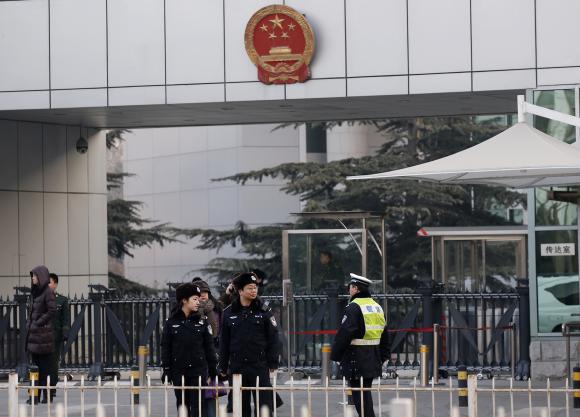South China Morning Post’s Nectar Gan reports on Ministry of Justice plans for a new lawyer ranking scheme to be piloted in Shanghai, Inner Mongolia, Anhui and Shaanxi, placing political loyalty ahead of professional ability and experience.
Under the new system, lawyers will be classified into nine specialist areas, ranging from criminal law to intellectual property law. The system would help people seeking legal services to narrow their search, the notice said.
But lawyers would have to meet four criteria to be listed, the top one being political correctness, followed by record of “integrity”, length of experience and professional skills.
The political performance assessment includes supporting the Communist Party’s leadership and “socialist rule by law”, abiding by the constitution and law, and observing the legal profession’s ethics and discipline.
The integrity criterion would require applicants to have a clean record on party discipline and administrative penalties, such as detention, in the past five years. [Source]
Amnesty International’s Nicholas Bequelin and Human Rights Watch’s Sophie Richardson commented on Twitter:
.@bequelin Less a noose and more a guillotine, it now seems.
— Sophie Richardson (@SophieDRich) April 14, 2017
The rankings mark a further step in the government’s refinement of the legal system as an instrument of power, rather than a shield against it. In a recent review of judicial reforms at Foreign Affairs, Rebecca Liao wrote that “Beijing’s goal is to establish a robust legal system that can effectively govern China’s political and social life without ever challenging the Communist Party’s core policies and ideology.” In August 2015, NYU law scholar Jerome Cohen warned of “a comprehensive legislative agenda designed to confirm China as a de facto garrison state,” under which “any lawyer bold enough to wage a vigorous defense in court can easily be sentenced to three years in prison, marking the end of his career.” He described the then-recent “Black Friday” or “709” crackdown on rights lawyers as “an effort to destroy any remaining possibility of waging a vigorous defense at trial or of challenging government in the broader arena of public opinion.”
In a review of Sida Liu and Terence C. Halliday’s recent book “Criminal Defense in China: The Politics of Lawyers at Work” at Bloomberg Law, Gabe Friedman describes how different segments of China’s legal community have reacted to blows like the 2015 crackdown and the earlier prosecution of lawyer Li Zhuang in Chonqging:
[…] Whereas at one point in time only a “small network of notable activist lawyers in China” took on sensitive cases, the Li case mobilized a wider group of lawyers, including “elite members of the Chinese legal profession” to leverage greater tolerance of lawyer professionalism from the Chinese government.
In July 2015, the Chinese government launched a crackdown against what the authors characterize as “die-hard” lawyers, who take on the most politically sensitive cases, such as death penalty, torture, and abortion. After one of the first lawyers was arrested, more than 100 signed a petition demanding to know her whereabouts, the authors note in an example of further mobilization. But many of the lawyers who signed were themselves arrested, some detained for 24 hours and some still in custody, according to the book.
Meanwhile, China’s domestic corporate law firms have stayed silent on the sidelines, even though many of the corporate lawyers possess liberal values, because “they seem content to bury those values under their largely non-political practice,” the book states.
[…] Still, the authors write that “over the last 400 years … across the world,” there are multiple examples of lawyers working alone or collectively to push for greater legal freedoms “vibrant civil societies, and moderate states.” They ask: will this also happen in China? But their answer is that there is no straight line in history, and there will likely be false starts and setbacks to progress, with a detailed look at how lawyers survive in the meantime. [Source]
As research from the University of Toronto’s Citizen Lab shows, online mobilization of the kind seen in support of Li Zhuang has become harder in the Black Friday lawyers’ cases because of increasingly sophisticated filtering of related messages and images.
See also Susan Finder’s analysis at her Supreme People’s Court Monitor blog of authorities’ declaration of a “decisive battle” to deepen judicial reform before the 19th Party Congress later this year, and Xinhua’s coverage (in Chinese) of propaganda chief Liu Qibao’s teleconference address this week on “blending the legal system with socialist core values.”








